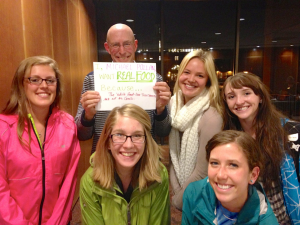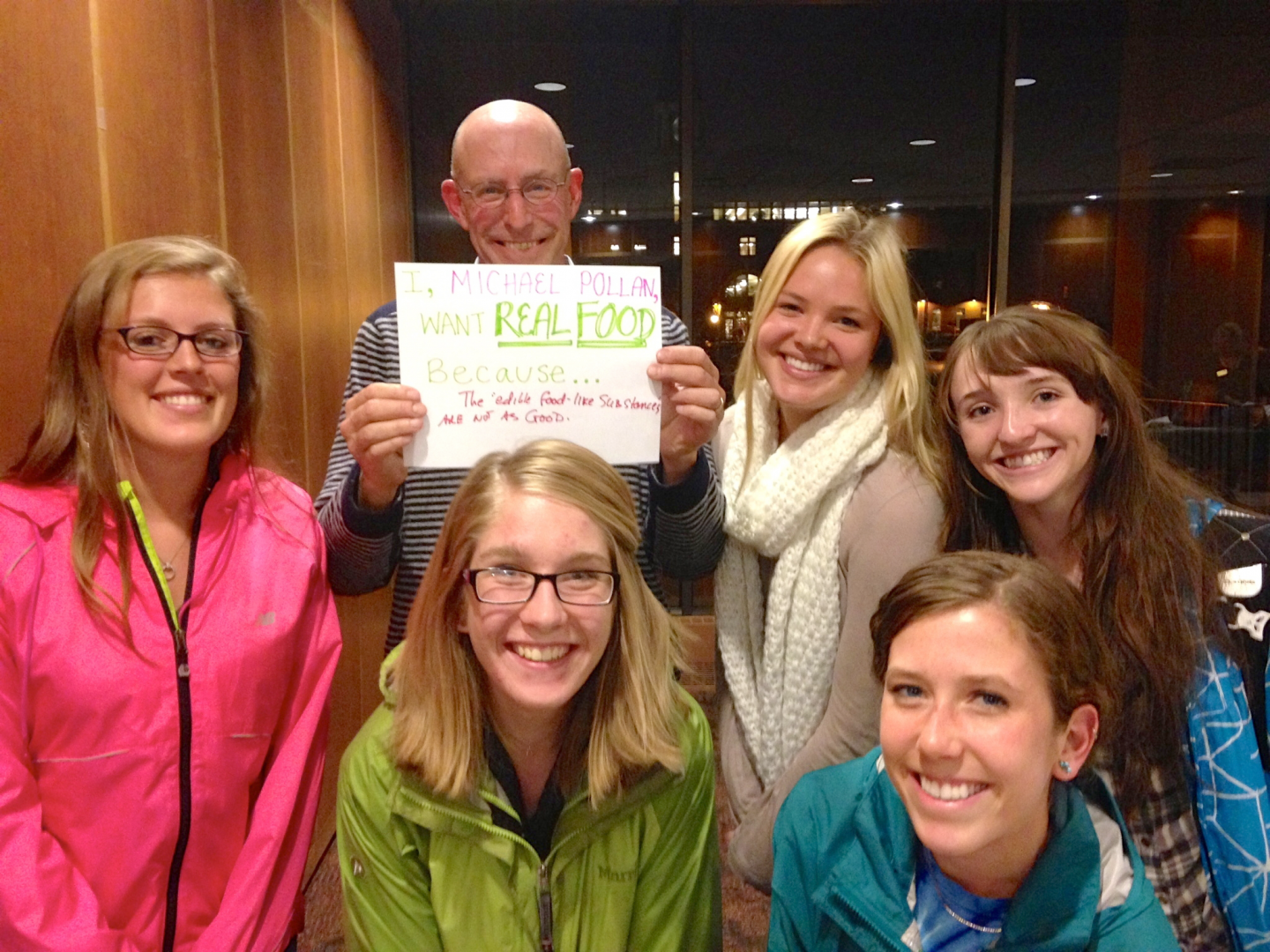
Famous for his research in food, agriculture, health and the environment, author Michael Pollan has written four New York Times Bestselling books. His latest book, “Cooked: A Natural History of Transformation,” came out on April 23.
On Wednesday night, Pollan spoke to a crowd of 446 people, including DU students, in Davis Auditorium at 7 p.m. The event, hosted by DU’s Enrichment Program and the Tattered Cover Bookstore, cost $35, which included a copy of “Cooked” and was sold out a week and a half before the event, according to Deb Olson, director of the Enrichment Program.
The Enrichment Program is part of the University College, the college of professional and continuing studies at DU. Tattered Cover Bookstore was looking for a larger venue to host Michael Pollan and DU’s Davis Auditorium was large enough to hold the event, according to Olson.
Although the event’s audience was predominantly parent and adult oriented, Pollan still had advice for college students. Pollan suggested organizing fellow students to change the food service. Some of the DU students in attendance included people in the Students for Sustainable Food Club who are advocates of changing the food service.
Junior geography major from Wilton, Conn, Kathryn Saphire, is the founder of the club and a fan of Pollan’s work.
“I am a huge Michael Pollan fan; every time I read one of his books, I feel like my perspective on food, plants, culture, industry and nature is completely altered,” said Saphire. “So it was really great to hear him articulate his perspective in person.”
Pollan grew up in Long Island and attended Bennington College, Oxford University and Columbia University and now lives in the Bay Area where he is a professor at the UC Berkeley Graduate School of Journalism. For the past 25 years, Pollan has been on a journey following the American food chain, and his speech addressed one of the key issues facing American society today: the decline in cooking.
Pollan’s speech highlighted the evolution of cooking and the journey he took within his own kitchen while writing this book. Pollan himself admitted to the crowd that he used to be apprehensive of the kitchen but now appreciates what it takes to make a meal.
“I was a thoughtless cook, an impatient cook; I always fought that time in the kitchen, I didn’t think I had enough of it and there was always something better I could do when I was sautéing the onions,” said Pollan.
His latest book, “Cooked,” looks at the middle ground between the earth and health in the food chain and is less of an argument than an adventure story, according to Pollan.
“The middle link of the food chain is taking things coming out of nature, plants and animals mostly, and we transform them into delicious, nutritious foods, or the opposite, things to eat,” said Pollan.
One of the key points in Pollan’s speech was how the industrialized food system has come to overpower the American diet within the home and within the grocery store.
“I came to understand that the way our food gets cooked or processed and I juxtapose those words because we use the word ‘cooked’ when we are talking about what humans do and we use the word ‘processed’ when we are talking about what corporations do and it is really good that our language has preserved that distinction,” said Pollan.
Pollan related to the audience by sharing his memories of cooking in the kitchen with his mother and grandmother and how meals used to be the basis of the American society. Pollan noted his favorite memory of his mother cooking his favorite dish of Chicken Kiev.
“Meals, I think, are one of the most important institutions of human life and of, I would argue, of democracy. I actually think the family meal is the nursery of democracy,” said Pollan. “Think about what your children learn at the table: They learn the art of conversation, the news of the day … this is really important teaching time and we are losing it and this is why I think the collapse of cooking is something to worry about.”
When studying the nutritional aspect of food, Pollan researched the science of nutrients and realized the complexity of digestion and food composition. Pollan mentioned the health consequences that accompany a diet based on industrialized food versus cooked food.
“I realized the cooking piece was very important to our health and at the same time it was very important to our agriculture.”
At one point, Pollan warned the audience that this was not a book filled with 20-minute recipes, but rather a book about slow food and how to appreciate the time it takes to cook a meal.
“Cooking goes really deep in our collective and individual pasts and that’s why I believe we have this unshakeable thing, even though we don’t have as much time as we once did to do it,” said Pollan.
For the final part of his speech, Pollan read a passage from “Cooked” about a night off he took from cooking to eat a microwaved meal from the grocery store with his family. Pollan’s passage highlights what many American families struggle with and his memories of the frozen food section resonated with the crowd as they shook their heads and laughed in agreement about how home meal replacements, such as microwave meals, have replaced cooking.
“Very little about this meal was shared,” said Pollan. “The single-serving portions served to disconnect us from one another, clearly as much as from the origins of this food, which, beyond the familiar logos, we could only guess at. Microwave night was a notably individualistic experience marked by centrifugal energies, a certain opaqueness and, after it was all over, a remarkable quantity of trash.”
Saphire urges college students to take advantage of Pollan’s advice and utilize the resources to cook.
“I do think there are many other social and economic complications college students face regarding cooking and proper meal times,” said Saphire. “Kitchen space may be limited to a microwave and mini-fridge and many of us seem to preference alcohol quantity over food quality when funds are tight. To add insult to our mostly amateur cooking skills, there are oh so many fast, cheap food establishments within walking distance.”
Pollan recognized that food service is unavoidable sometimes.
“There are times in your life when food service is going to be what you have got, but there is no reason food service can’t support good agriculture and actually be good healthy food,” said Pollan.
Of the collaboration between the Enrichment Program and Tattered Cover, Olson stressed that there will be similar events in the future.
“[This event] was the first collaboration, but won’t be the last,” said Olson. “We’re bringing Elizabeth Gilbert to campus in the fall on October 12.”











